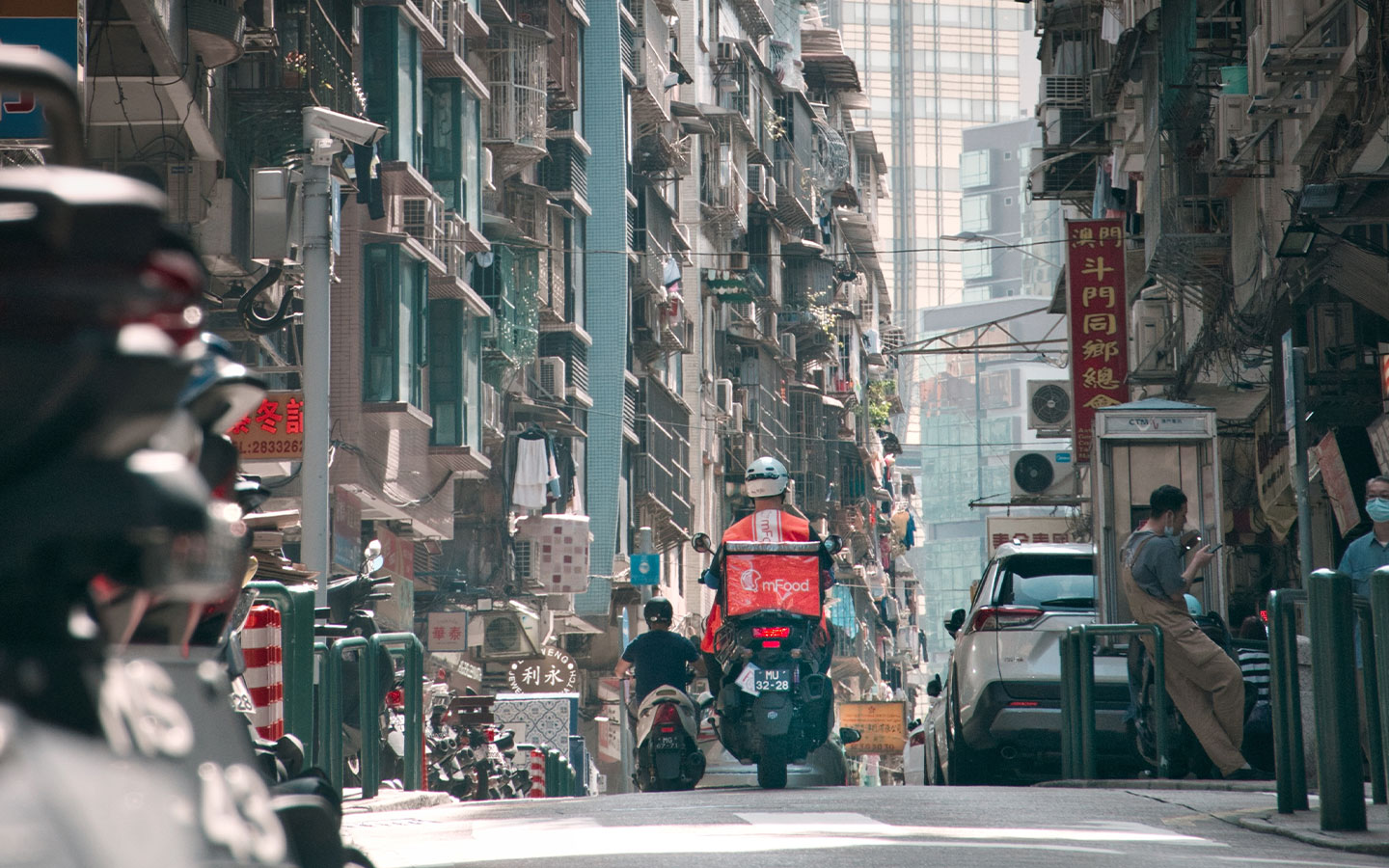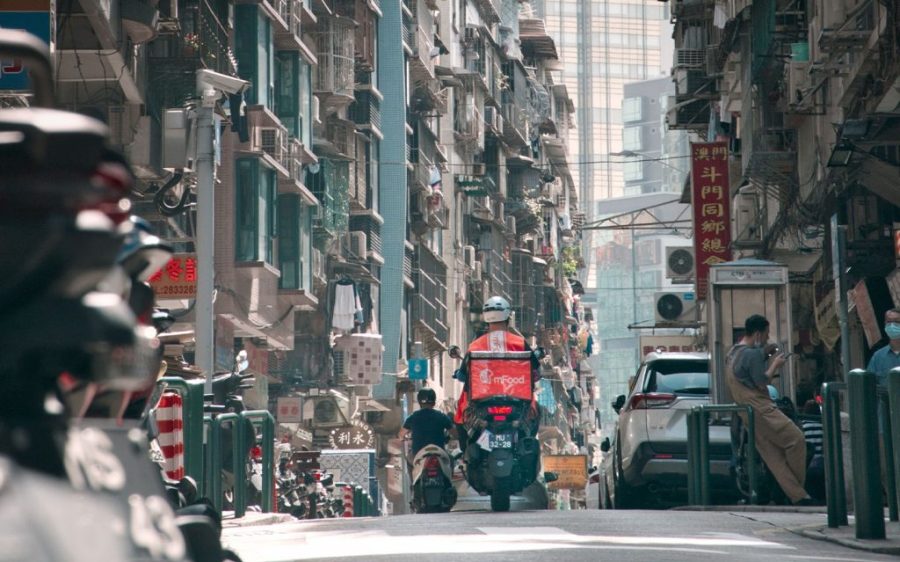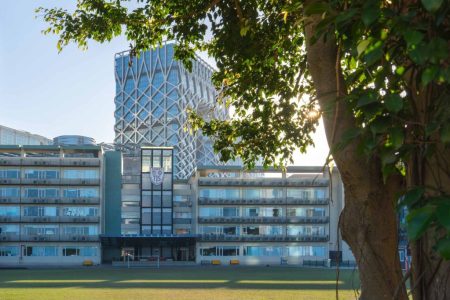The Covid-19 pandemic changed so many aspects of our lives, including the way we eat. Throughout the crisis, many residents discovered roadblocks to getting fresh food and hot meals, and increasingly turned to home delivery companies such as Aomi (澳覓), mFood, and Tikbee (閃蜂). Food delivery was especially crucial during citywide lockdowns and serious outbreaks, including the large-scale outbreak that started in December 2022, since going out for food could increase the likelihood of infection.
Thankfully, an influx of food delivery workers, also known as riders, enabled food delivery companies to meet increased demand for fresh meals and grocery necessities. In addition to enduring the pandemic, these riders also braved harsh weather to keep us fed in times of crisis, from powerful typhoons to scorching summer heat waves.
But who are these unsung heroes, and what’s their job really like? Macao News interviewed three to find out.
Due to their employers’ confidentiality requirements, we’ll refer to them as Rider A, Rider B, and Rider C. Their interviews have been edited for length and clarity.
Rider A: A former salesman who lost his job
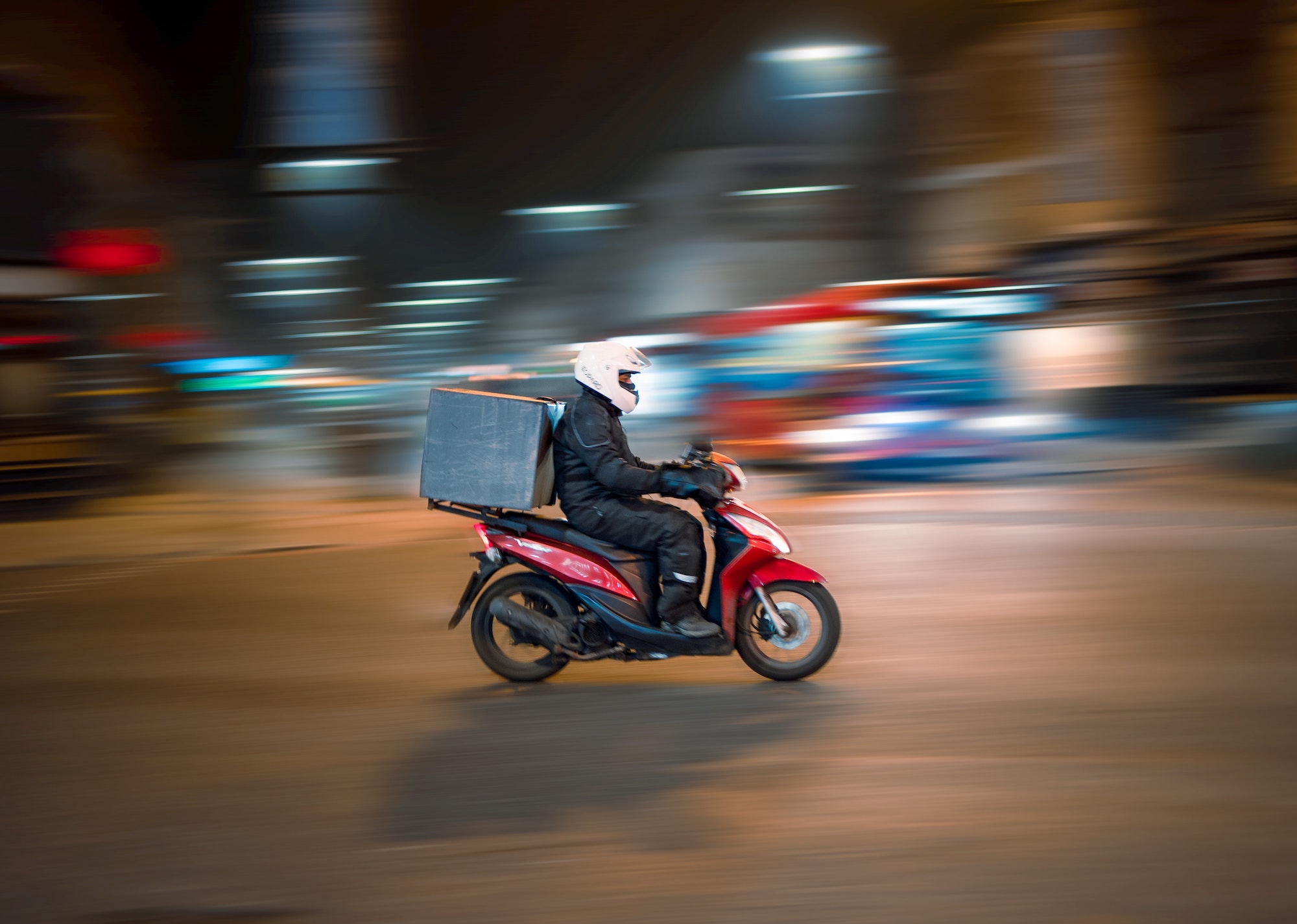
Rider A joined Aomi at the beginning of the pandemic in early 2020, after losing his job when his former company closed. As a full-time rider, the 29-year-old Macao citizen delivers around 35-40 meal orders in an eight-hour day, earning between MOP 20,000 and MOP 25,000 monthly.
Rider A says he misses his old job in sales at an advertising company. He liked the work and felt safer in an office than driving around the city streets, but there was nothing he could do.
“I was left with no choice but to switch jobs,” he says. “It was a ‘stop working, stop eating’ situation.”
Rider A soon realised that he wasn’t alone. After hearing about many people – often from the city’s beleaguered gaming industry – who had to find other work due to the pandemic, he felt grateful for his newfound job security. “As long as you work, you can maintain a living. And as a rider, there’s no risk of being made redundant.”
He also discovered another job perk: camaraderie and friendship. “When new riders join the company, they may be initially unfamiliar with the routes; we help each other out, allowing us to begin chatting and get to know each other.”
But the work also involves challenges that are seldom noticed or appreciated by customers.
“There was this customer I delivered to several times,” Rider A begins. “Given his location in terms of Macao’s road infrastructure, he would be the last [customer] to receive his meal. He monitored the map and my route, accusing me of deliberately taking a ‘longer path’ to prolong the delivery time.”
Such complaints wear on Rider A’s psyche and take a cut from his paycheque, since riders are paid per completed order rather than an hourly rate or a salary.
“Because of customers [like the one mentioned above] drafting complaints, the company is starting to reduce the number of orders allocated to each rider and hiring more workers to shorten delivery times,” he says. “Eventually, riders end up with fewer orders, and our [financial] situations become difficult.”
“As long as you work, you can maintain a living. And as a rider, there’s no risk of being made redundant.”
Finances, however, are less of an issue right now. Rider A says the most recent Covid-19 wave following the reopening of borders in December 2022, caused a surge in food deliveries. “On normal days, we are assigned two or three orders [at once], but during [the height of the outbreak], there were around six or seven orders all at once.”
But Rider A’s health has become more of a concern since he himself fell ill with Covid-19. Though he only experienced mild symptoms, Rider A says it still impacted his job. “I get easily tired climbing stairs and start panting a lot after just climbing two or three levels.” His fear of bringing the virus home to his family also increased his anxiety.
Despite the on-the-job challenges, Rider A reports many pleasant encounters, too. For instance, he received “red packets” during Chinese New Year, and once, when the temperature dropped below 10 degrees Celsius, a cup of warm Vitasoy milk.
Rider A is modest when asked whether he considers him a “city hero”. “I am just an ordinary person, [what I do is] nothing much worth praising,” he says, adding that the job has given him more empathy. “When I order a meal delivery, I don’t pester the rider delivering my food because I can understand [their struggles] better.”
Rider B: A job of last resort
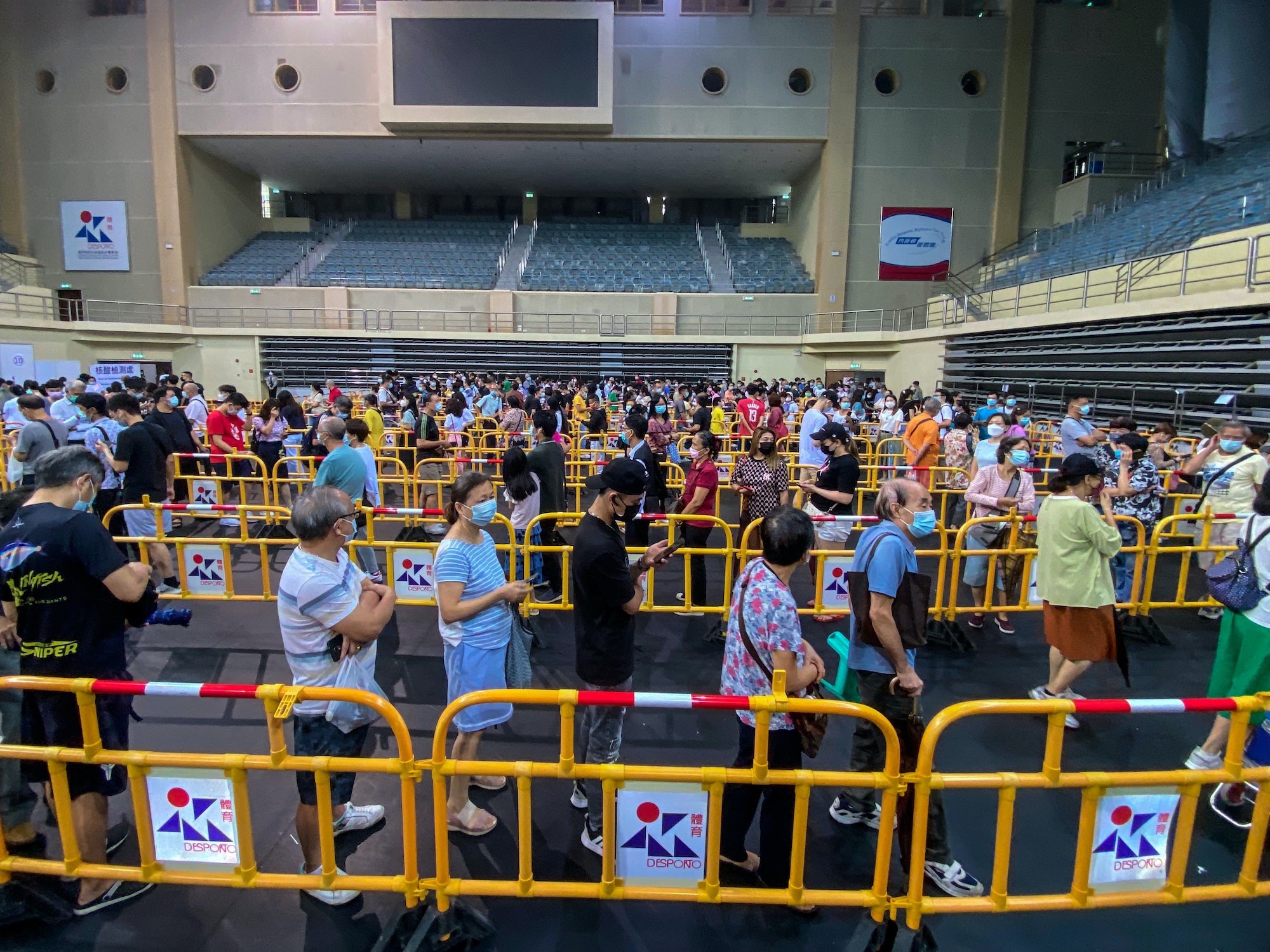
Rider B, 32, makes deliveries part-time for mFood. He works about four hours daily to complete at least 18 orders, though he can deliver up to 38 orders during peak periods – such as rainy days or typhoons. Rider B earns at least MOP 400 daily; MOP 800-1,000 if it’s busy.
He says he reluctantly joined mFood in May 2022, when Suncity’s VIP rooms closed due to the money-laundering scandal involving former CEO Alvin Chau. The closures caused mass layoffs, and Rider B lost his job as a receptionist.
For Rider B, working as a delivery man was a last resort. “Basically anyone, provided they have a motorbike licence, is qualified, and everyone is replaceable,” he says.
But it’s a job he has come to appreciate, not least because the flexible schedule enables him to spend more time with his two children.
“Anyone is qualified, and everyone is replaceable.”
Still, Rider B says the risks can be high. A fatal traffic accident involving an mFood delivery man in 2022 has made riders far more safety-conscious, according to Rider B.
The job also has logistical hurdles and many frustrations, such as when customers cause delays by not answering their phones. “Some people might be in meetings, others are just doing their own things, some even claim to have fallen asleep,” he says. “One way or the other, it really affects our pre-set route, and everything just becomes inconvenient for us.”
While riders have played a vital role during Covid-19 lockdowns by enabling people to isolate indoors, Rider B does not consider himself a hero. He says he’s just doing his job.
During the Covid-19 outbreak in June and August last year, Rider B continued to work, though was anxious he’d bring home the virus. With two young children at home, he was extra cautious, but what he could do was still very limited. “I brought a sanitiser spray with me; I kept spraying,” he says. “That was all I could do.”
Rider C: A recent graduate looking for work
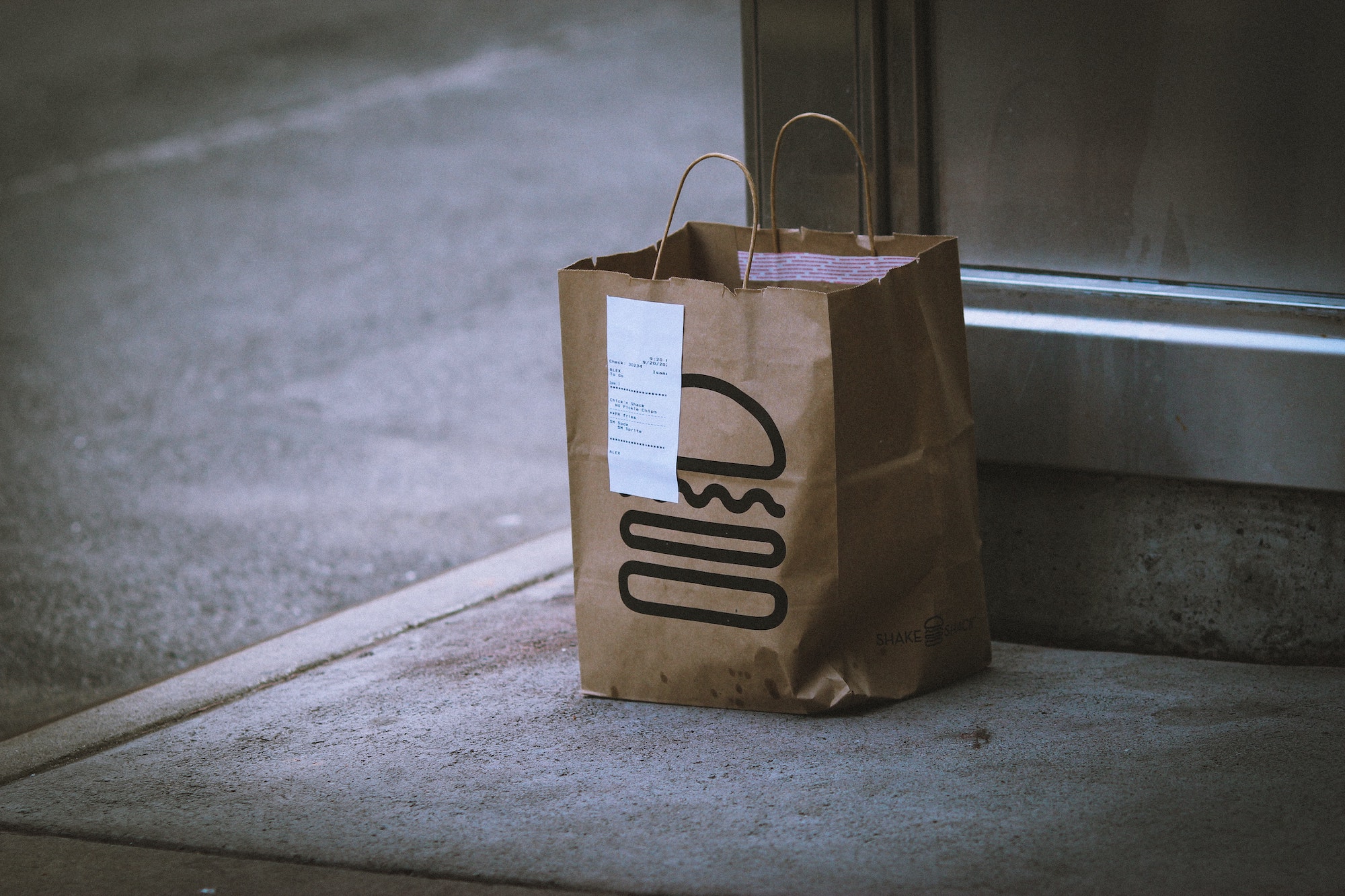
Rider C studied tourism management at university, only to encounter an industry in upheaval when he graduated in 2022. “Due to the pandemic, tourism is on the decline, so employment opportunities are just hard to find,” he explains.
To make a living, Rider C works part-time for Tikbee, a relative newcomer to the meal delivery scene. Before September 2022, the company worked exclusively with Sunsco supermarket to deliver groceries to people’s homes. During the pandemic, Tikbee expanded as demand soared.
The 21-year-old works between 20 and 40 hours a month. In that time, he can deliver anywhere from 100 to 200 orders, earning between MOP 3,000 and MOP 4,000 per month.
Rider C says the pandemic drove many people into the food delivery industry, especially those who worked at casinos, as it is one of the few jobs offering a similar salary. “It’s difficult for them to consider other lower-paying jobs when burdened with mortgages and other monthly bills,” he says.
“I think all delivery men only have one thing in mind – to accomplish their tasks on time.”
In the span of a few years, food delivery has transformed from a side hustle into a full-time job, according to Rider C. “In Taipa itself, there are 100-200 riders [doing delivery for a living], and around 100 work full-time to support themselves and their families,” he estimates.
Macao News contacted the Labour Affairs Bureau to learn the total number of riders in the city and how fast the industry grew over the past three years, but the department did not have relevant statistics. Macao News also reached out to the delivery companies directly, but didn’t receive any responses before publication.
Upbeat about his job, Rider C says there are many benefits, especially the flexibility. “I can go job-hunting and decide to further my studies or work at other part-time jobs simultaneously. Very few jobs offer this.”
But he also understands there are dangers involved. When Rider C told his family he would work as a delivery man, they expressed concerns about his safety while zipping around Macao’s busy streets.
To help ease his family’s worries, he says he does everything he can to minimise the risks on the road. “I try to balance it out,” he explains. “For example, I don’t check in [to work] when there’s a typhoon or on a scorching hot, freezing cold or rainy day.”
He says he also tries to work between 9 and 11 am, when fewer cars are on the road, “just so my family doesn’t have to worry too much about me.”
While Rider C takes precautions, he hopes food delivery companies will also increase support for their riders. “I think for part-timers, [existing safety measures] are not sufficient,” he says.
According to Rider C, Tikbee does not pay for part-time riders’ insurance, which means he would not be protected in the case of a traffic accident leading to death or severe injuries. It’s a high-risk job, says Rider C, especially when delivering bulky groceries.
“Sometimes people order a whole box of water, and for that to be placed on our motorbike… it occupies a lot of space in the first place, yet we are often required to deliver multiple orders simultaneously.”
Rider C acknowledges some riders drive too recklessly. He recalls several viral videos on social media, showing motorbikes swerving wildly in front of larger vehicles and attempting to squeeze through gaps in traffic – only to collide with cars. But Rider C insists most are responsible, albeit rushing under time pressures since their work efficiency is directly linked to pay. Riders are paid per order, so many hustle to get assigned a new round of orders.
“By no means do I encourage non-compliance to traffic rules, but I think all delivery men only have one thing in mind: to accomplish their tasks on time,” he says. “Especially with frequent road construction, taking a shortcut could save loads of time.”
Despite the risks and challenges the job entails, Rider C has found one perk that trumps them all: the kind interactions with his customers, even the simplest thank yous: “It is those moments that make me feel like my efforts are worth it.”
